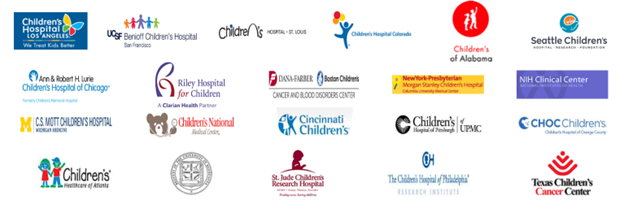About the Pediatric Early Phase Clinical Trials Network (PEP-CTN)
The Pediatric Early Phase Clinical Trials Network (PEP-CTN) was established in 2019 to continue the work of the Children's Oncology Group (COG) phase 1 consortium. Its primary mission is to identify and develop effective new agents for children and adolescents with cancer, through rational and efficient clinical and laboratory research. The PEP-CTN designs and conducts pediatric early phase trials, including phase 1 trials (often with phase 2 expansion cohorts) and pilot studies of novel agents or regimens to determine their tolerability. These early-phase studies enable promising agents to proceed to definitive phase 3 clinical trials.
PEP-CTN's consortium infrastructure supports early-phase trials, pilot tolerability trials, as well as pharmacokinetic and biomarker studies for the development of new pediatric anti-cancer agents. COG sites were selected through a peer-review process to participate in PEP-CTN. 21 core sites in the U.S. participate in all PEP-CTN trials; 21 non-core sites in the U.S., Canada, and Australia participate in selected trials. The PEP-CTN Operations and Data/Statistics Center (ODSC) is embedded within the COG ODSC.
The PEP-CTN is supported by NCI cooperative agreement award UM1-CA228823.
Find a PEP-CTN site on the COG PEP-CTN Website.
Important characteristics of the PEP-CTN include:
- Recognition of the need for seamless transitions from phase 1 to phase 2 testing, reflected by the PEP-CTN name, emphasizing "early phase" clinical trials;
- Establishment of the Pediatric Early Phase Agent Prioritization Committee (APC) to prioritize agents for evaluation by the PEP-CTN and to expedite the pace at which novel investigational agents enter clinical testing in children with cancer;
- Addition of central monitoring for all PEP-CTN clinical trials; and
- Incorporation of relevant biological/genomic evaluations to establish eligibility for PEP-CTN clinical trials and/or to facilitate factors determining the activity of agents studied by the PEP-CTN.
About the Pediatric Brain Tumor Consortium (PBTC)
The Pediatric Brain Tumor Consortium (PBTC) is composed of 15 academic centers and children's hospitals located across the United States and Canada which are competitively selected based on their scientific excellence and clinical expertise in pediatric brain tumors. The PBTC's primary objective is to rapidly conduct novel phase 1 and 2 clinical evaluations of new therapeutic agents, treatment delivery technologies and radiation treatment strategies in children from infancy to 21 years of age with primary central nervous system (CNS) tumors.
Following an assessment of how best to utilize its clinical trial resources for maximum impact, NCI has determined that the optimal way to do this is to strengthen the Pediatric Early Phase Clinical Trials Network (PEP-CTN) infrastructure for conducting early phase clinical trials for children with brain tumors. NCI will work to promote efficient collaboration between the PEP-CTN and the COG CNS Tumor Committee with the goal of accelerating the pace of innovative trials for children with brain tumors. As part of the transition to increased NCI support for the PEP-CTN, the PBTC will not be able to apply for another 5-year funding award to continue its funding beyond March 2026. However, NCI is committed to ensuring that ongoing PBTC trials are completed wherever feasible and appropriate, either through direct close-out support to the PBTC after its current funding ends or by transferring studies to the PEP-CTN for completion.
For more information about the transition, see Transition of Pediatric Brain Tumor Trials to Pediatric Early Phase Clinical Trials Network (PEP-CTN).

